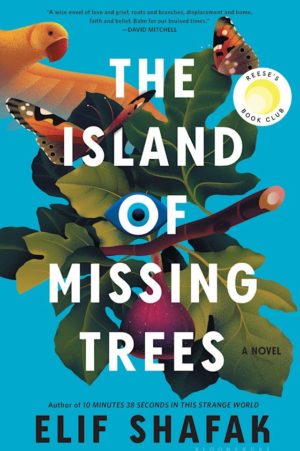The Island of Missing Trees
by Elif Shafak
reviewed by Sezen Ünlüönen
Turkish-British author Elif Shafak’s new novel, The Island of Missing Trees, revisits some of her favorite themes: nonlinear history, the redemptive power of stories, and immigrants and outsiders. The titular island of the novel is Cyprus, and the story mostly moves between the 2010s and the early 1970s, right around the time when intercommunal violence between the island’s Turkish and Greek communities escalated. At the heart of the novel is a star-crossed couple—Kostas, a Greek Cypriot, and Defne, a Turkish Cypriot. By the time we reach the 2010s, Kostas and Defne are married, have moved to England, and are raising a daughter named Ada (“island” in Turkish), but their past still haunts them.
Shafak draws on a rich array of sources in her latest novel. Not only does the story feature a prominent fig-tree narrator, who brings her own arboreal expertise into the story, but Shafak also uses the island as a focal point to weave together myth (Aphrodite is believed to have emerged from the water in Cyprus), politics (the UN Committee on Missing Persons’ work in Cyprus), zoology (the mass die-off of fruit bats in the island in the 1970s), and lepidopterology (Cyprus remains an important waypoint for the annual migration cycle of Painted Lady butterflies).
Though rich in historical anecdotes, interesting trivia, and local color—Cypriot delicacies, Turkish proverbs, and Greek terms of endearment abound—the novel is most significant as a piece of historical recovery. The Island of Missing Trees announces this project on its very first page: “Cartography is another name for stories told by winners. For stories told by those who have lost, there isn’t one.” If cartography—here standing in for history—is the story of the winners, The Island of Missing Trees, by implication, is the story of the losers: people like Kostas and Defne, whose lives have been irrevocably altered by civil strife on the island.
The great theorizer of the historical novel, György Lukács, writes that the real merit of historical novels is not that they reproduce local customs and language with great accuracy—a task in which The Island of Missing Trees shows considerable investment—but that they dramatize historical forces in such a way that the inevitability of what happened becomes clear. The best historical novels choose their characters so that, even though they are “middle-of-the-road,” ordinary individuals, they can still help us understand how, for instance, feudalism had to make way for capitalism.
Shafak’s project sits uneasily within that understanding of the historical novel. On the one hand, the characterization seems apt: we have one Turkish Cypriot and one Greek Cypriot who embody historic conflict, a teenage daughter who stands for the new generation, and an aunt who stands for tradition. None of these characters are developed beyond what is strictly necessary for their narrative purpose. At the end of the novel, practically all we know about Define and Kostas, for example, is that one is a Turkish Cypriot (and an archaeologist), the other a Greek Cypriot (and a plant scientist), and that the civil unrest in the island made their lives very difficult.
For Shafak, history is essentially opaque, and politics is what ruins individuals’ lives. If only nationalism and herd mentality, which create an us-versus-them mindset, were to leave individuals alone, none of the atrocities described in the novel would have taken place. But even if we buy into Shafak’s depiction of history as the story of winners, the losers of history, whose plight is taken up by the novel, never come into being as fully fleshed individuals. Nor do they understand (or help us understand) how it was possible that two communities that lived side by side for so long could one day turn around and murder each other.
The novel’s handling of an episode involving Ada is telling. Early in the novel, Ada starts to scream uncontrollably in her history class. A classmate captures the moment on video and posts it on social media. The video goes viral, with its own hashtag: #doyouhearmenow. Yet by the end of the novel, this whole episode turns out to be a nonevent. Ada just goes back to school, and life goes on. The project of giving voice to the losers of history turns out to be an empty promise that isn’t delivered on. Yes, we hear the voice, but we still don’t know what it’s saying.
Published on December 2, 2021

